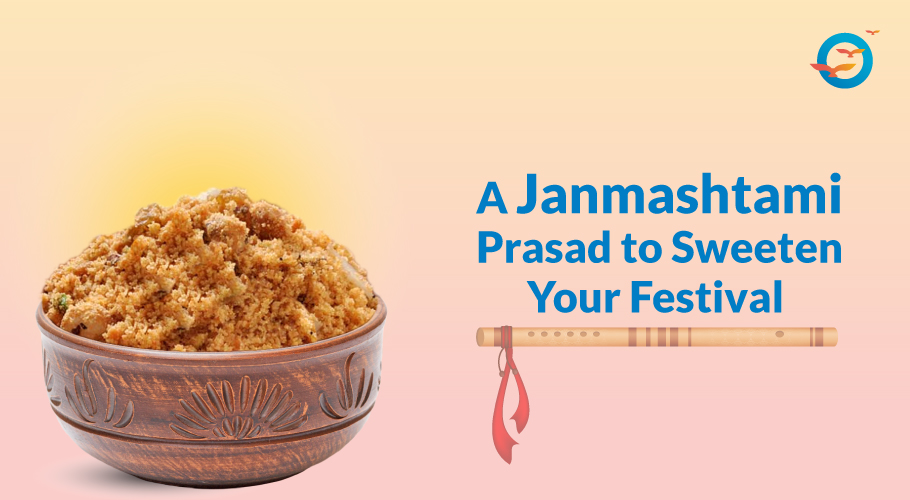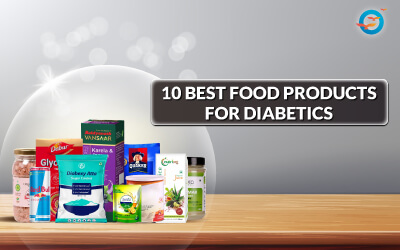Janmashtami Prasad: 8 Best Health Benefits of Panjiri (Panjeri)

A special Janmashtami prasad to sweeten your Festivities
The Janmashtami is celebrated with fasting and puja. Of the many special Janmashtami prasad (devotional offerings—usually foods—offered to God and later shared among devotees) that are prepared on the occasion, the most popular one is surely Panjiri (also spelled ‘panjeri). This Janmashtami prasad dish is made on many festive occasions and is commonly associated with fasting. There are many health reasons for this, as we shall see.
Janmashtami, which falls on 18th August this year, has a special place in the hearts of all devotees of Lord Krishna. Hindu legends say Lord Krishna was born in this month—Shravana—on the eighth day of the paksha, i.e. 18 August 2022.
FFD’s Janmashtami Prasad-Panjiri (Panjeri)
The Janmashtami prasad- Panjiri is made with several nutritious ingredients, including ghee, dry fruits, coriander seeds, lotus seeds, almonds, cardamon, and some powdered sugar—which we will replace with stevia, so as to retain the sweet component without spiking Blood Sugar Levels (BSL). The seeds are added to replace grains, which are proscribed during fasts—again, this has health benefits, especially for diabetics.
Each ingredient offers its own medicinal values, which makes this Janmashtami prasad- Panjiri prasad dish exceptionally nutritious and a great way to mark your spiritual fervour while safely satisfying any sweet cravings you may have. There are a lot of dhaniya panjiri benefits.
Items required for Janmashtami Parsad-Panjiri
- Desiccated coconut flour- 3/4 cup
- Coriander seeds- 1 cup
- Melon seeds- 5 tsp
- Coconut ghee- 7 tbsp
- Lotus seeds- 1 cup
- Almonds, diced and roasted- 3 tbsp
- Cardamom- 3 1/2 tsp
- Stevia 6-8 drops
Janmashtami Parsad- Panjiri recipe
- Dry roast the coconut flour on a low flame until it turns a rich golden hue.
- Add the coconut ghee, coriander seeds, and cardamom pods and continue roasting until the ghee is absorbed into the flour and the flour releases the aroma of the spices.
- Now add diced and roasted almonds, lotus seeds, and shelled melon seeds, and stir the mixture until everything is roasted perfectly.
- Finally, add the stevia and turn off the flame.
- Your Panjiri Prasad is ready!
Janmashtami Prasad- Panjiri Health Benefits
1. Desiccated Coconut Flour
There is some small-scale research that suggests that coconut oil can help in reducing waist circumference, lowering insulin resistance, and improving levels of HDL cholesterol. In addition, coconuts contain many beneficial nutrients, such as:
- Vitamin C
- Thiamin (vitamin B1)
- Folate
- Potassium
- Manganese
- Copper
- Selenium
- Iron
- Phosphorous
- Potassium
- Coconut is rich in dietary fiber, which helps lower cholesterol levels and the risk of developing a cardiac disease.
- Its flour is lower in carbohydrates than wheat- and corn flour, lowering the impact it has on blood glucose levels.
- Coconut flour is also gluten-free, making it a good option for people suffering from celiac disease.
- Coconut flour is also a good source of protein, a valuable nutrient for cell growth and repair. Protein also fights food cravings by inducing satiety for a longer period.
- The water of the coconut is also beneficial; it is naturally refreshing and has a high content of electrolytes (salts and minerals), which makes it a good re-hydrating drink and the ideal post-workout drink.
2. Coriander Seeds
- Coriander is commonly used in Indian dishes for its flavor, but it also has strong medicinal properties. It contains bio-active components, flavonoids, and phenolic acids.
- These make coriander a potent antioxidant, anti-diabetic, digestive stimulant, anti-hypertensive, cholesterol-lowering, and anticancer agent. It also contains essential volatile oils, which give it a pleasant flavor.
- Coriander seeds have no cholesterol content and are a good source of vitamins, lipids, and minerals, such as potassium, calcium, phosphorus, magnesium, sodium, zinc, and folate.
- Studies show that incorporating ground coriander seed extract in one’s diet leads to a marked decline in blood glucose and a rise in levels of insulin.
3. Melon Seeds
- Watermelon seeds are high in zinc, which is an important nutrient for building immunity. Zinc is also essential for the digestive system and nervous systems.
- It helps in cell growth and cell division, and it plays a role in enabling taste and smell.
- Melon seeds also contain a high percentage of magnesium, which aids in metabolic functions; it is needed to maintain nerve and muscle function.
- Watermelon seeds are a good source of both monounsaturated and polyunsaturated fatty acids.
- These fats help lower levels of LDL “bad” cholesterol, protecting against heart attack and stroke,
4. Coconut Ghee
- Ghee is the current darling of the health-food crowd, and while it does have many undeniable positives, the fact that it is an animal product, and thus, high in saturated fat outweighs the perceived benefits.
- In addition, animal milk and milk products contain a compound known as Insulin-like Growth Factors (IGF), which prevent insulin functionality and raise blood sugar levels.
- Instead of regular ghee, we advocate the use of vegan ghee, or Interesterified ghee, over all others.
- This includes vegetable Vanaspati, which, while vegetarian, are high in transfats, saturated fats, and highly oxidative.
- Ghee made from coconut milk is the ideal replacement, as it contains Polyunsaturated Fatty Acids, and Monounsaturated Fatty Acids; has no cholesterol or trans fats, is rich in Vitamins A & D, and has a delicious nutty flavour.
5. Lotus Seeds
- Lotus seeds are eaten raw or often added to foods as ingredients. They are also used as health supplements.
- The entire lotus plant can be consumed: the root stalks (rhizome) as food, seed as medicine, thalamus (the thick part of the stem near the flower) as fruit, leaves are used as a plate (thali), stalks can be pickled, petals provide color, and tender leaves are eater as a vegetable.
- Lotus seeds are rich in protein, carbs, and polyphenols, which help regulate blood pressure levels and promote circulation by keeping blood vessels healthy and flexible.
- They also help dissipate chronic inflammation—a risk factor for insulin resistance and heart disease. and polysaccharides—plant components that lend structural support, and enable energy storage and cellular communication.
- They are known to be anti-tumor, anti-coagulant, anti-inflammatory, anti-microbial, and antiviral. In addition to all this, lotus seeds have a low fat content and are high in amino acids, which are the body’s building blocks for muscle.
6. Almonds, diced and roasted
- Like all nuts, almonds are nutrient-dense and rich in healthy fats & protein.
- Nuts contain vegetable protein, unsaturated fatty acids, fiber, phytosterols (cholesterol-lowering elements), phenolic compounds (potent antioxidants), calcium, magnesium, potassium, and Vitamins like folic acid, niacin, and B6.
- Almonds are known to reduce the risk of heart disease, BP, and inflammation. They are anti-oxidative and help in reducing visceral adiposity (belly fat) and improving vascular reactivity.
- Some studies suggest that regular nut consumption can lower the risk of diabetes by improving insulin sensitivity.
7. Cardamom
- Cardamom is commonly used as a spice to flavor a number of dishes. In addition to its culinary properties, it is also a potent antioxidant and used in traditional medicinal preparations to regulate BP.
- Some studies suggest cardamom powder can fight cancer and has a natural ability to kill tumors. It is rich in anti-inflammatory compounds, which help reduce the risk of diabetes, and other metabolic disorders.
- Cardamom is anti-bacterial and has been used since ancient times to kill mouth bacteria thus battling bad breath and improving oral health—in fact, it is an ingredient in one popular international chewing gum brand.
8. Stevia
- If Diabetes has a public enemy no.1, that dubious distinction would surely belong to sugar.
- It immediately raises blood sugar levels, causes spikes and troughs in mood, damages teeth, joints, skin, liver, heart, pancreas, and kidneys, induces unhealthy food cravings, and leads to weight gain.
- Stevia is a much healthier alternative—it contains no carbohydrates, calories, or artificial ingredients.
- Plus it is 100 times sweeter than sugar.
- For these reasons, FFD’s Panjiri recipe uses stevia in lieu of regular store-bought sugar.
Conclusion
Panjiri makes an excellent Janmashtami prasad—both nutritious and tasty. It contains many healthy ingredients including nuts, seeds, and spices that are known to reduce oxidative stress, battle inflammation, and improve insulin sensitivity, among others. Unlike traditional Janmashtami prasad Panjiri, FFD’s recipe eschews ghee and sugar, for healthy substitutes like coconut ghee and stevia. Panjiri can be had and shared as Prasad, but this healthy dish can also be enjoyed as a dessert, anytime you feel a sweet craving coming on. Dhaniya Panjiri benefits can be enjoyed on Janmashtami.

